
Opportunities for free camping in Australia are many so if you are thinking of hitting the road and want to save big money, read on!
Thousands of free camping opportunities can be found in Australia’s expansive outback, peaceful wilderness, great beaches, and islands. With the coronavirus restrictions keeping you in your own state, there are a vast range of free camping opportunities nearby. Between Rest Areas, Roadside stops, National Parks, State Forests and Reserves you can quite easily travel without spending a dollar.
Free camping your way around Australia will slash money off the cost of your trip and leave money for the things you need as you travel around. Before you hit the road, a little planning and organising goes a long way!

1. What are the Advantages of Free Camping?

- The ultimate benefit of parking up at a FREE camping spot and it not eating into your budget means there is MORE cash left over for food, cold beers, fuel and fun.
- Freedom of choosing where to stop (legally) whether by the ocean, in a National Park or State Forest and surrounded by nature and wildlife. (Be careful though as if your main reason to free camp is to save money it may turn awfully expensive if you are fined camping in a restricted area)
- Secluded spots can be found to escape the crowds as many people do not know where or how to find free campgrounds.
- No pre booking necessary, so if you decide to stay longer you are free to do so.
2. Is Free Camping in National Parks allowed?

To manage numbers in each location during COVID -19 and abide to social distancing rules, bookings are now required for all campgrounds and campsites in NSW national parks, including those without camping fees. Other states and territories have similar rules. All free campgrounds now have a non-refundable $6 booking fee. To make an online booking for NSW go to
https://www.nationalparks.nsw.gov.au/camping-and-accommodation
You can also check the NPWS COVID-19 update page:
https://www.nationalparks.nsw.gov.au/npws-covid-19
Each state or territory has their own page for important updates via the national park websites.
Free camping is not just available anywhere in a National Park. There are officially designated areas of the Australia that are inexpensive or free:
National Parks – Look out for signposts or local tourist offices or go to the following websites to help you find national park campgrounds: –
NSW https://www.nationalparks.nsw.gov.au/search?term=free+campsites
VIC https://www.parks.vic.gov.au/search?search=CAMPING
QLD https://parks.des.qld.gov.au/camping
WA https://www.dpaw.wa.gov.au/
SA https://www.parks.sa.gov.au/know-before-you-go/camping
3. What can you expect in State Forest camping?

Camping is free in many State Forests, but some require payment. In NSW State Forests all camping is free. Some State forests allow camping in any part of the forest providing you do not interfere with logging or other operations and follow the rules of that State Forest. Others have designated areas for camping.
Toilet facilities may be limited but some have ‘long drop toilets’. Many State Forests have fireplaces for BBQs and depending on fire restrictions having a campfire is often permitted too if they are fully extinguished as you leave. State Forest’s roads are public roads so all vehicles including trail bikes must be registered. Four-wheel drives and trial bikes are allowed on the formed roads and fire trails. There are plenty allocated bushwalking tracks waiting to be explored and as dogs are usually allowed, so they can accompany you on the many walks.
You are not going to find the level of amenity that you would find in a National Park, but you will have more freedom and less restrictions on what you can do.
NSW – https://www.forestrycorporation.com.au/
QSL – https://parks.des.qld.gov.au/camping
VIC – https://www.forestsandreserves.vic.gov.au/
SA – https://www.forestrysa.com.au/camping/
WA – https://www.dpaw.wa.gov.au/management/forests/visit-our-forests
4. What are the rules about Free Camping in Roadside Rest Areas?
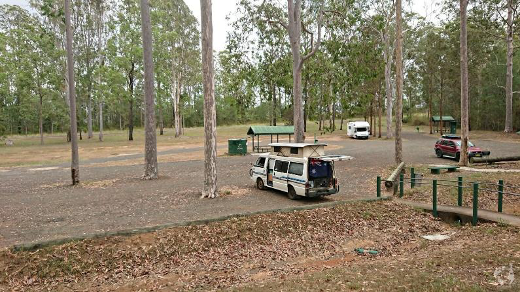
Roadside rest areas, are found along the highways which are rest stops for both truck drivers and travellers where they can stay for 24 hours. Many of these places allow you to stay overnight but will be fined if you set up camp.
Australia has long stretches of driving between towns and cities. Long haul truck drivers are required by law to take programmed rest breaks to reduce fatigue, so a network of these roadside stops exist around the country’s outback highways. This means that you must be aware that you run the risk of being hit by an incoming truck during the night.
Each State and territory look after their own roadside stops, so facilities vary. Some are just a place to pull off the road and others are areas which include toilet facilities BBQ, picnic tables and an information bay.
5. How do you spot a Bush Camp?
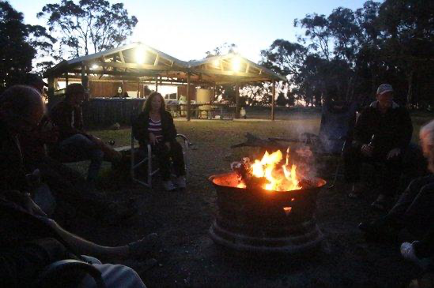
When there are no rest areas available and you need to pull over for the night then it is a case of using common sense to find somewhere suitable.
Unfortunately, there are much fewer options for Bush Camping in Australia these days. As the number of travellers have increased, some places have been closed off to camping. When deciding to camp in an informal / bush camp sites, it is important to check who owns the land as the owners may not agree to intruders setting up a tent!
There are free, and often remote, camps located just off the main highway in small towns. Keep your eyes peeled for them as you can easily drive past them. Speak to the locals and stop by local tourism offices to get the heads up. As you travel further from towns and cities and into the outback there are plenty of opportunities to find a place to stop for the night. Many outback roads are dotted with small tree lined creek beds which are a good place to stop, providing there is no sign of flash flooding.
Once you get beyond the highways and major roads, then you move into the territory of ‘bush camping’ and State Forests & Reserves are the best place to start looking. One way is to get your hands on The Big Lappers Guidebook, which during the COVID-19 pandemic is being offered as a FREE download!
6. Can you Free Camp at Dams or Reservoirs?
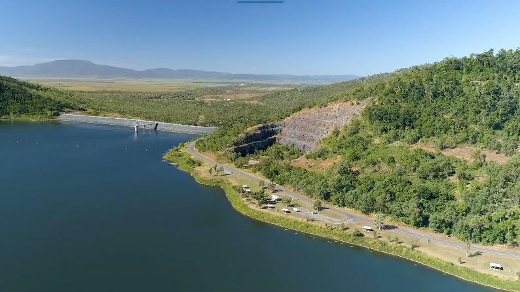
Water supply authorities manage dams which often include campgrounds by the edge of the dam of which some are free! Usually they have a large open space where you can camp on the edge of the water and often have toilets, showers, boat launching facilities and fish cleaning areas. They make great family camping so are popular during school holidays.
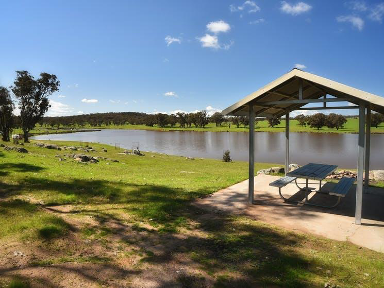
In NSW, the Bethungra Dam and Reserve offers free camping in a picturesque location. The public recreation area allows canoeing, sailing, picnics, swimming, and fishing. Campers can make use of the toilets, BBQs, and bins provided.
Others can be found:
QLD https://parks.des.qld.gov.au/camping
NSW https://www.waternsw.com.au/
VIC https://www.water.vic.gov.au/
7. Are there any Free Campsite Apps?
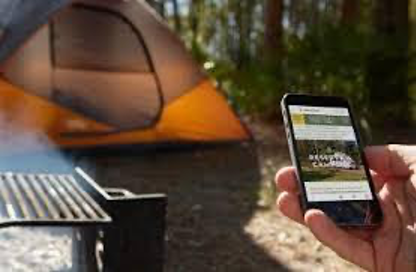
Your phone is potentially the greatest help to finding free campsites. There are many apps which tell you where to find free campsites as well as what amenities they have such as toilets, BBQs and more. Some of the apps even work offline. You can download maps and view locations easily, even without data. Below are the most highly rated: –
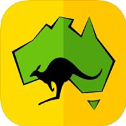
The most popular is Wikicamps as it helps its users locate campsites, caravan parks and roadside rest areas that are suitable for your vehicle. This app is crowdsourced, meaning that the user community adds new camp sites and rates and reviews the existing ones. The app is under $10 and it is a once off purchase with no ongoing subscription.

Travellers Autobarn is also an absolute must! The app functions as a map with hundreds of pinpointed campgrounds and comments about each one. The app informs you on BBQ rules, toilets, showers, dump stations and whether the site is pet friendly.

Campermate App is a free app that helps you find everything you need from camping and RV specific information and thousands of tips from other travellers.
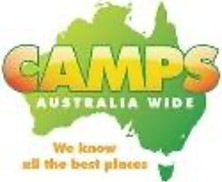
Camps Australia Wide app includes free and low-cost campsites, maps, GPS co-ordinates, pet friendly stays, mobile phone coverage, public dumpsites, reviews and more. It costs $9.99 to download but the licence may be shared with one other device if your partner needs to share too.
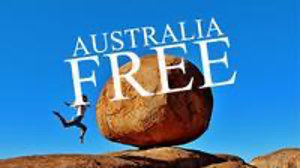
Australia Free App is a comprehensive travel guide to the best free activities and camping spots located throughout Australia with thousands of free activities listed.
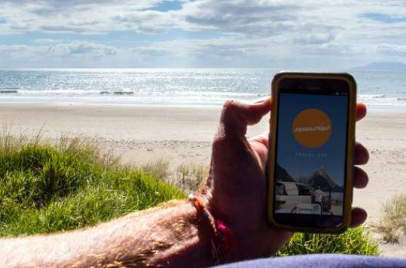
Spaceship Camping App This useful app will allow you to find out what deals are available close by, where to find Wi-Fi hotspots, road warnings, and where petrol stations are located. No more guessing or wandering around aimlessly.
8. What Preparation do you Need to have for Free Camping?
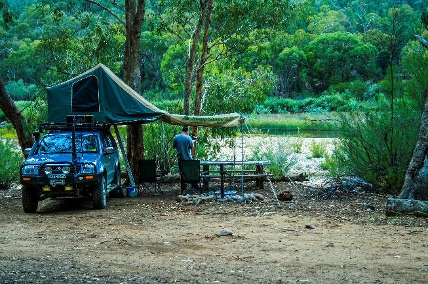
If you are driving an RV, towing a caravan, sleeping in your van, sleeping in your swag, have a rooftop tent or any other vehicle that you sleep in, then you are already well set up for free camping. Then the answer is to be as self-sufficient as possible in all the other areas.
The key is to have your own water and power on board and either your own toilet or handy tools to dig and cover up when you find a quiet spot nearby! Many state forest campgrounds and official roadside rest areas have toilets but best to be prepared, as some rest areas do not.
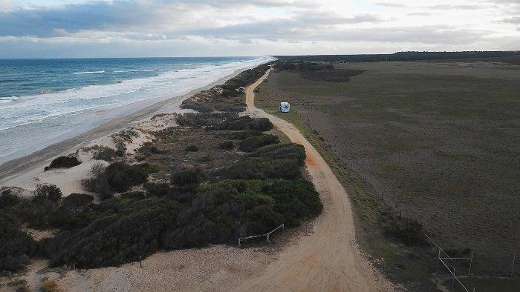
A good store of your own food and basic supplies are always needed to fall back on in case there is nothing else around.
The less you have to set up as you arrive, the easier it is to pull into roadside stops for quick overnighters. You need to plan where the next stop will be, how long it will take you to get there, and have an alternative in case something goes wrong.

A good idea is to download a Camping Checklist app or Checklist App (Packing List) so you can stay organised and ensure you have everything you need for the trip. CamperMate lets you customise and create a tailored camping checklist for different types of camping. Alternatively you can go online to https://checklist.com/camping-checklist where you will find a full camping checklist with all the gear you need. Here you can save the checklist to your account and then customise the list to your needs. Also, a useful tip is to note down anything you are missing and need for your next trip.
Check the weather outlook for your road trip and be aware of any severe weather warnings. Checking road conditions and if there are any roads which may be unsuitable for your vehicle.
9. Is Free Camping Safe?
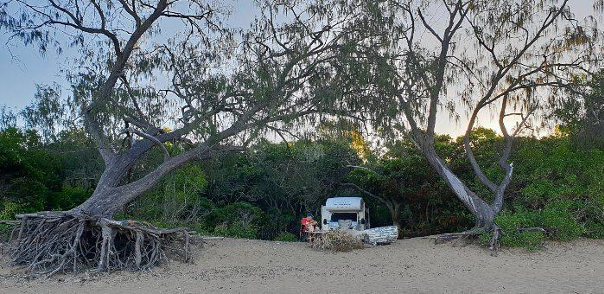
In Australia free camping is generally considered to be a safe venture and certainly adds more adventure to your trip as well as being a money saver. Even though there is an element of vulnerability that you need to consider, thousands of like-minded people on the road are safely enjoying free camping. It is common to meet other adventurers, who are mostly eager to be friendly and share their travel experiences with you and advise you on safe spots.
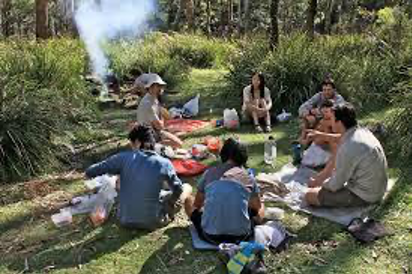
Be cautious and look for free camping spots which have a group of other travellers as the chances of being bothered by undesirable types is reduced if there are other campers nearby. Best not to invite trouble by leaving your things out where it can be easily stolen and make sure your doors are locked at night.
If there are not many other campers around then look for a spot that is some distance from a road so that you cannot be seen by passing traffic. A nice quiet campsite can be found behind a hill, behind trees or down by creeks and rivers which give the opportunity to get off the road far enough to be invisible. Many roads which are likely to flood, have tracks cut off them into the bush, which drain the water when it is raining heavily. Here you can easily access areas which are a couple of hundred metres off the road and into the trees, secretly camping in a private area.
10. What must you do as you leave the campsite?
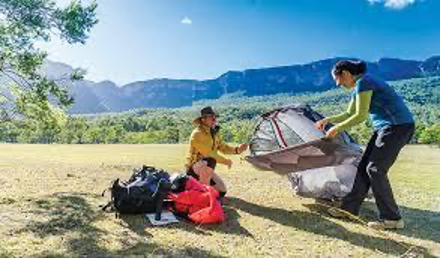
The rule of thumb is to:
- Dispose of waste properly and do not leave litter behind.
- Minimize campfire impacts and always put a fire fully out before you leave.
- Respect wildlife.
- Keep the noise to an absolute minimum.
- Be considerate to others around as you leave no trace that you have been there.
